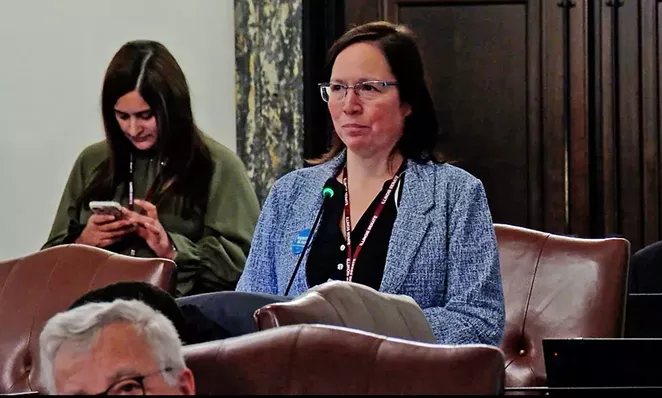
“This is a milestone accomplishment for people with disabilities across Illinois,” said Ryan Croke, first assistant deputy governor, of the state’s decision to end subminimum wage.
On Nov. 21, the Senate took a bipartisan vote and passed legislation known as the Dignity in Pay Act, sending it to Gov. JB Pritzker for signature, who has previously indicated he supports the bill. It would prohibit businesses and nonprofit organizations from paying workers with disabilities less than minimum wage.
“We're doing something that I really hope will contribute to the changing of a lot of hearts and minds in a way that opens doors for an entire class of human beings who far too frequently have doors closed on the basis of who they are,” Croke said.
Previously, the law allowed organizations holding a 14c certificate to pay less than minimum wage for employees who are disabled. In practice, this meant everything from predatory companies using disabled laborers in the same way as non-disabled laborers, but paying them significantly less, to disabled individuals participating in workshops to earn money piecemeal.
Doug McDonald, executive director of Sparc, a Springfield-based nonprofit that serves people with disabilities, said at first, he was concerned that individuals in the care of Sparc would no longer be able to earn their own money and gain a sense of pride and dignity in work. Opponents of ending the practice have long argued that companies would decline to employ disabled workers if they had to be paid the same hourly wage.
However, the more McDonald learned about how organizations have transitioned in states that have already ended the subminimum wage, the more he became convinced that it could be done in Illinois, too.
“I'm feeling much more confident that this will work well,” said McDonald.
Sparc ended subminimum wage in its organization last year, while Land of Lincoln Goodwill Industries has not utilized subminimum wage since 2021.
McDonald said he was pleased with the bipartisan efforts of the bill, which included a wide range of stakeholders, with concerns being addressed in the provisions of the bill. The House approved it on a bipartisan vote in May following lengthy negotiations. It now includes a five-year transition period, and organizations that currently employ the 2,000 workers in Illinois who are paid a subminimum wage will receive grants to assist with phasing it out.
“I ended up co-chairing the subgroup that will put together the recommendations for monitoring,” McDonald said. “The people I work with and the Illinois Council on Developmental Disabilities, we have one primary goal – to make sure no one gets hurt by this. We're building recommendations and a tracking system to make sure that people are protected.”
The state of Illinois has also increased the personal needs allowance of people residing in group homes or community integrated living arrangements from $60 a month to $100 a month, which will then be indexed to inflation. “This will be meaningful for more than 11,000 people in Illinois,” said Croke.
Advocates for disabled rights are thrilled with the end of subminimum wage.
“We are celebrating that passage,” said Pete Roberts, executive director of Springfield Center for Independent Living. “I've been here for about 32 years as director. I've hired a lot of people with disabilities who were able to perform the essential functions of their positions, so we're proactive for people to receive a fair wage.”
“I just emailed the family today to celebrate the passage of the subminimum wage law,” said Roberts.
Missy Norman, an area disability rights advocate and wheelchair user since birth, said the bill was a long time coming. “Once the $15 minimum wage was passed for everyone, I was like OK, the things that people have said about dignity and living wage for everybody – it's time that includes everybody.”
Croke said he was heartened by an academic study published Nov. 15 in the Journal of the American Medical Association that reveals in at least two states where subminimum wage was phased out, employment rates among people with disabilities have increased.
“Unemployment has decreased. The labor force participation rates increased. The number of disabled adults who want to work has increased in a statistically significant way,” said Croke.
The law also requires that the state put out a blueprint for employment for people with disabilities every year for the next five years.
“I'm super optimistic,” said Croke. “My hope is that this law really forces people all over Illinois to rethink what is possible for people with disabilities in the workplace. I hope it encourages people to give everybody a chance and to see the possibilities and promise of every person, regardless of an intellectual or development disability, a sensory impairment or physical or cognitive difference.”
In 2021, Carey Smith wrote about the subminimum wage ending for state agencies and is glad to hear it is being ended for good in Illinois as she is a firm believer in equity, equality and inclusion.













